Emotional Intelligence in the Workplace: Leadership and Team Dynamics
VerifiedAdded on 2021/04/21
|19
|5264
|136
Report
AI Summary
This report delves into the multifaceted concept of emotional intelligence (EI) within the workplace, exploring its critical role in leadership and team dynamics. It defines EI as the ability to understand and manage one's own emotions and those of others, emphasizing its impact on stress management, work quality, and workplace climate. The report outlines key attributes for leaders to develop, including self-awareness, self-control, motivation, empathy, and social skills. It analyzes how emotionally intelligent individuals foster trust, embrace differences, and communicate effectively to achieve organizational goals. The report further examines case studies illustrating communication barriers and provides strategies for overcoming them, particularly in cross-cultural settings. It highlights the importance of stress management, recognizing and managing emotions, effective non-verbal communication, humor, and conflict resolution in building strong relationships. Finally, the report addresses the challenges of managing diverse teams, emphasizing the need for cultural competency and sensitivity, particularly in areas like empathy and social skills, and offers actionable strategies for project leaders to enhance their EI and communication effectiveness.
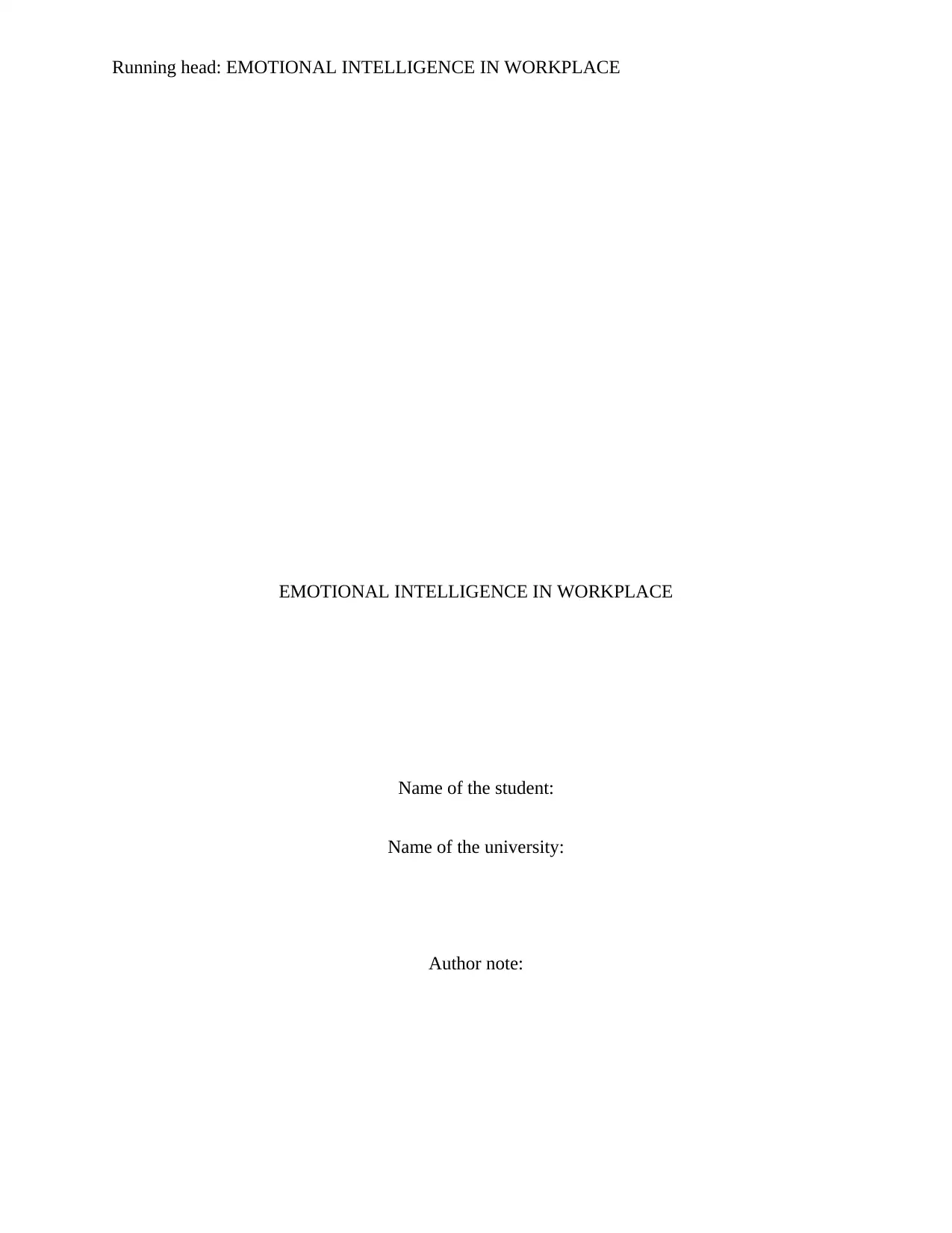
Running head: EMOTIONAL INTELLIGENCE IN WORKPLACE
EMOTIONAL INTELLIGENCE IN WORKPLACE
Name of the student:
Name of the university:
Author note:
EMOTIONAL INTELLIGENCE IN WORKPLACE
Name of the student:
Name of the university:
Author note:
Paraphrase This Document
Need a fresh take? Get an instant paraphrase of this document with our AI Paraphraser
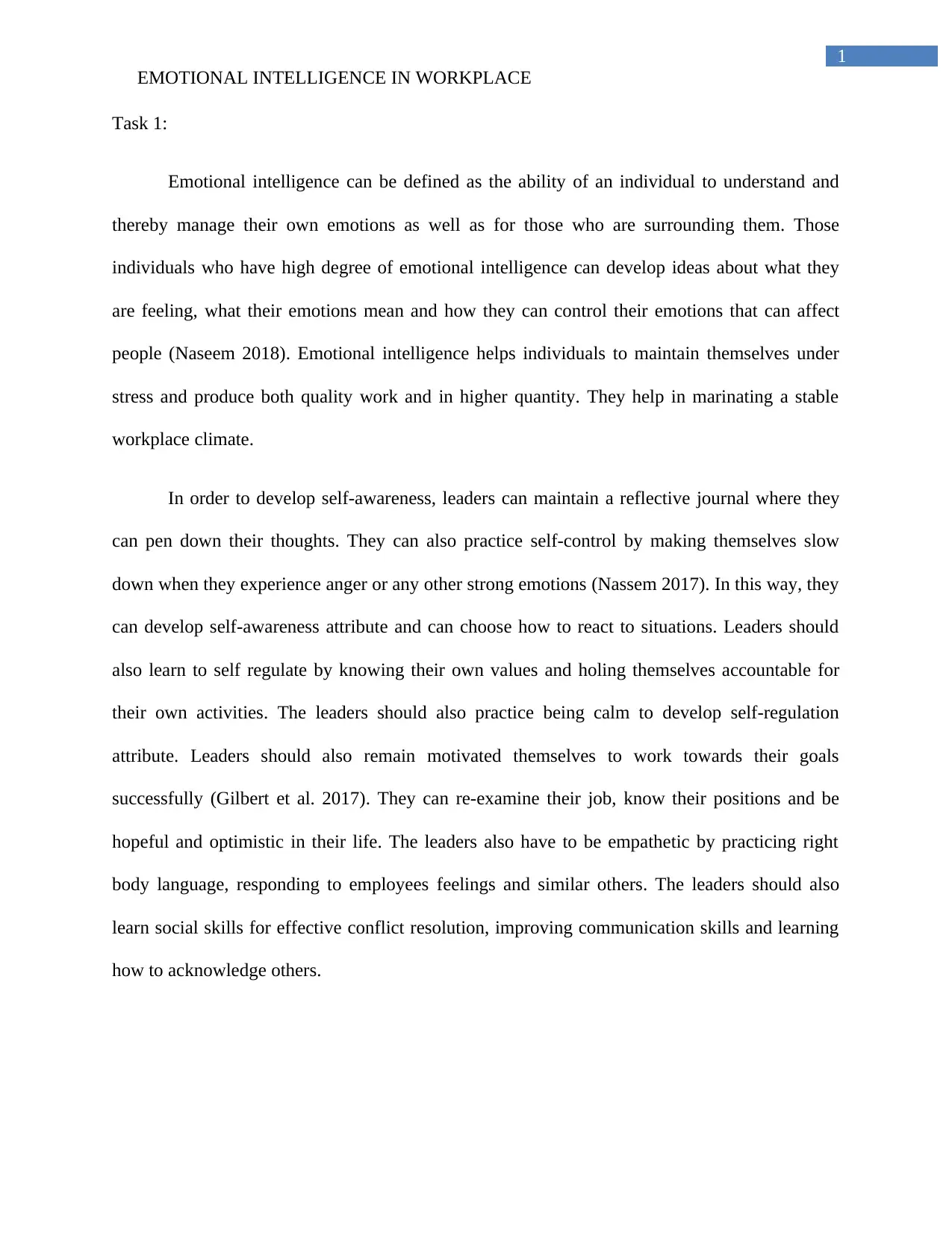
1
EMOTIONAL INTELLIGENCE IN WORKPLACE
Task 1:
Emotional intelligence can be defined as the ability of an individual to understand and
thereby manage their own emotions as well as for those who are surrounding them. Those
individuals who have high degree of emotional intelligence can develop ideas about what they
are feeling, what their emotions mean and how they can control their emotions that can affect
people (Naseem 2018). Emotional intelligence helps individuals to maintain themselves under
stress and produce both quality work and in higher quantity. They help in marinating a stable
workplace climate.
In order to develop self-awareness, leaders can maintain a reflective journal where they
can pen down their thoughts. They can also practice self-control by making themselves slow
down when they experience anger or any other strong emotions (Nassem 2017). In this way, they
can develop self-awareness attribute and can choose how to react to situations. Leaders should
also learn to self regulate by knowing their own values and holing themselves accountable for
their own activities. The leaders should also practice being calm to develop self-regulation
attribute. Leaders should also remain motivated themselves to work towards their goals
successfully (Gilbert et al. 2017). They can re-examine their job, know their positions and be
hopeful and optimistic in their life. The leaders also have to be empathetic by practicing right
body language, responding to employees feelings and similar others. The leaders should also
learn social skills for effective conflict resolution, improving communication skills and learning
how to acknowledge others.
EMOTIONAL INTELLIGENCE IN WORKPLACE
Task 1:
Emotional intelligence can be defined as the ability of an individual to understand and
thereby manage their own emotions as well as for those who are surrounding them. Those
individuals who have high degree of emotional intelligence can develop ideas about what they
are feeling, what their emotions mean and how they can control their emotions that can affect
people (Naseem 2018). Emotional intelligence helps individuals to maintain themselves under
stress and produce both quality work and in higher quantity. They help in marinating a stable
workplace climate.
In order to develop self-awareness, leaders can maintain a reflective journal where they
can pen down their thoughts. They can also practice self-control by making themselves slow
down when they experience anger or any other strong emotions (Nassem 2017). In this way, they
can develop self-awareness attribute and can choose how to react to situations. Leaders should
also learn to self regulate by knowing their own values and holing themselves accountable for
their own activities. The leaders should also practice being calm to develop self-regulation
attribute. Leaders should also remain motivated themselves to work towards their goals
successfully (Gilbert et al. 2017). They can re-examine their job, know their positions and be
hopeful and optimistic in their life. The leaders also have to be empathetic by practicing right
body language, responding to employees feelings and similar others. The leaders should also
learn social skills for effective conflict resolution, improving communication skills and learning
how to acknowledge others.
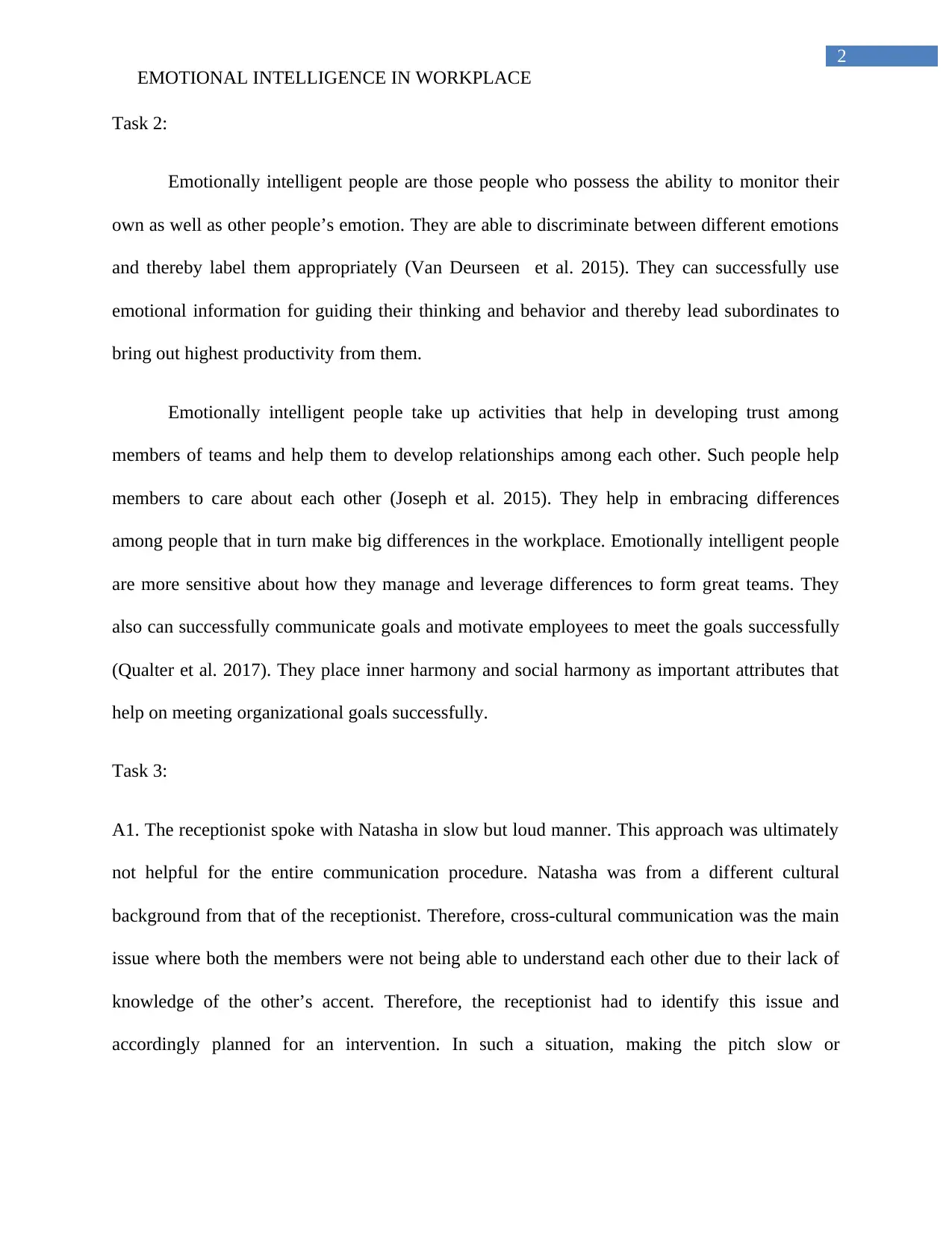
2
EMOTIONAL INTELLIGENCE IN WORKPLACE
Task 2:
Emotionally intelligent people are those people who possess the ability to monitor their
own as well as other people’s emotion. They are able to discriminate between different emotions
and thereby label them appropriately (Van Deurseen et al. 2015). They can successfully use
emotional information for guiding their thinking and behavior and thereby lead subordinates to
bring out highest productivity from them.
Emotionally intelligent people take up activities that help in developing trust among
members of teams and help them to develop relationships among each other. Such people help
members to care about each other (Joseph et al. 2015). They help in embracing differences
among people that in turn make big differences in the workplace. Emotionally intelligent people
are more sensitive about how they manage and leverage differences to form great teams. They
also can successfully communicate goals and motivate employees to meet the goals successfully
(Qualter et al. 2017). They place inner harmony and social harmony as important attributes that
help on meeting organizational goals successfully.
Task 3:
A1. The receptionist spoke with Natasha in slow but loud manner. This approach was ultimately
not helpful for the entire communication procedure. Natasha was from a different cultural
background from that of the receptionist. Therefore, cross-cultural communication was the main
issue where both the members were not being able to understand each other due to their lack of
knowledge of the other’s accent. Therefore, the receptionist had to identify this issue and
accordingly planned for an intervention. In such a situation, making the pitch slow or
EMOTIONAL INTELLIGENCE IN WORKPLACE
Task 2:
Emotionally intelligent people are those people who possess the ability to monitor their
own as well as other people’s emotion. They are able to discriminate between different emotions
and thereby label them appropriately (Van Deurseen et al. 2015). They can successfully use
emotional information for guiding their thinking and behavior and thereby lead subordinates to
bring out highest productivity from them.
Emotionally intelligent people take up activities that help in developing trust among
members of teams and help them to develop relationships among each other. Such people help
members to care about each other (Joseph et al. 2015). They help in embracing differences
among people that in turn make big differences in the workplace. Emotionally intelligent people
are more sensitive about how they manage and leverage differences to form great teams. They
also can successfully communicate goals and motivate employees to meet the goals successfully
(Qualter et al. 2017). They place inner harmony and social harmony as important attributes that
help on meeting organizational goals successfully.
Task 3:
A1. The receptionist spoke with Natasha in slow but loud manner. This approach was ultimately
not helpful for the entire communication procedure. Natasha was from a different cultural
background from that of the receptionist. Therefore, cross-cultural communication was the main
issue where both the members were not being able to understand each other due to their lack of
knowledge of the other’s accent. Therefore, the receptionist had to identify this issue and
accordingly planned for an intervention. In such a situation, making the pitch slow or
⊘ This is a preview!⊘
Do you want full access?
Subscribe today to unlock all pages.

Trusted by 1+ million students worldwide
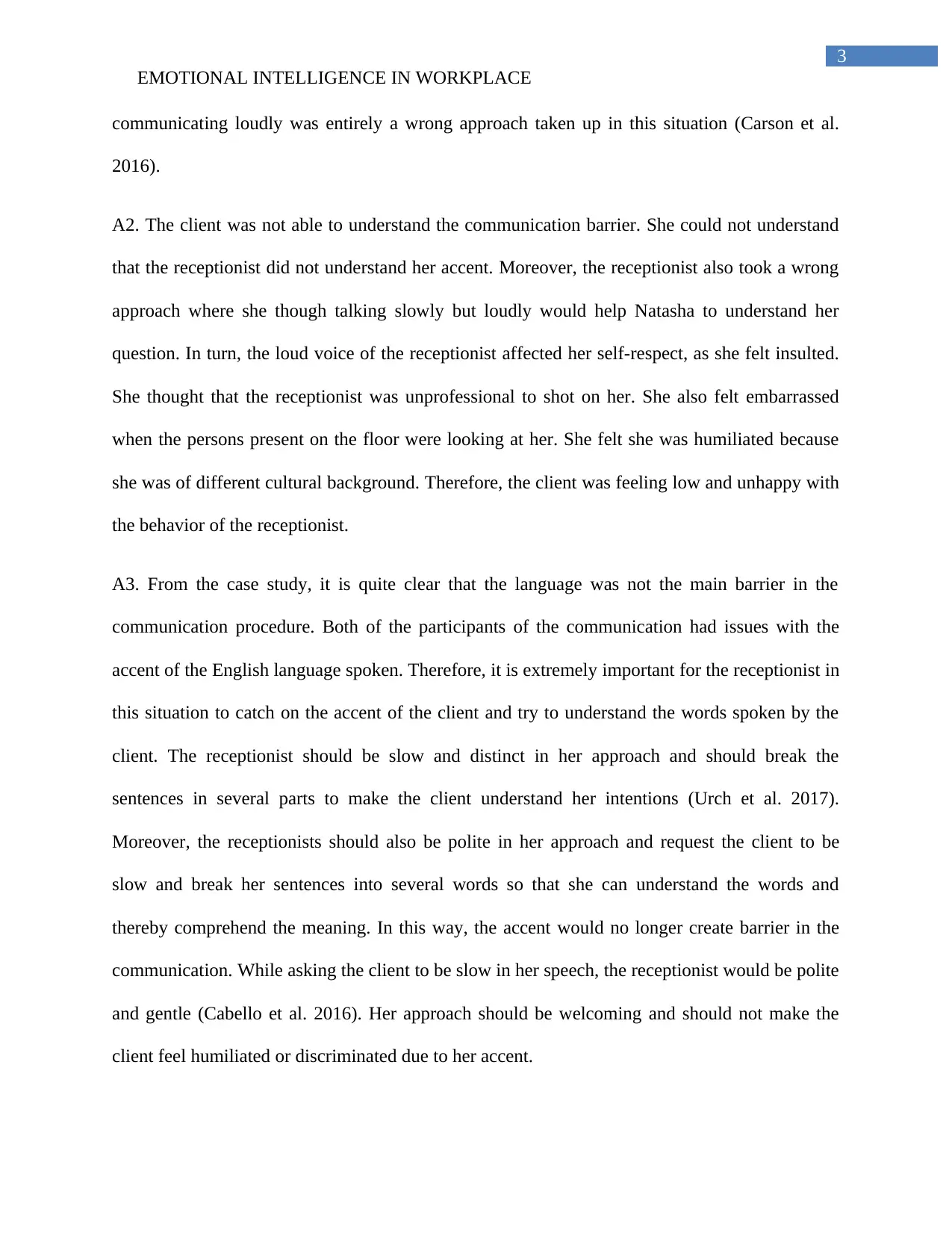
3
EMOTIONAL INTELLIGENCE IN WORKPLACE
communicating loudly was entirely a wrong approach taken up in this situation (Carson et al.
2016).
A2. The client was not able to understand the communication barrier. She could not understand
that the receptionist did not understand her accent. Moreover, the receptionist also took a wrong
approach where she though talking slowly but loudly would help Natasha to understand her
question. In turn, the loud voice of the receptionist affected her self-respect, as she felt insulted.
She thought that the receptionist was unprofessional to shot on her. She also felt embarrassed
when the persons present on the floor were looking at her. She felt she was humiliated because
she was of different cultural background. Therefore, the client was feeling low and unhappy with
the behavior of the receptionist.
A3. From the case study, it is quite clear that the language was not the main barrier in the
communication procedure. Both of the participants of the communication had issues with the
accent of the English language spoken. Therefore, it is extremely important for the receptionist in
this situation to catch on the accent of the client and try to understand the words spoken by the
client. The receptionist should be slow and distinct in her approach and should break the
sentences in several parts to make the client understand her intentions (Urch et al. 2017).
Moreover, the receptionists should also be polite in her approach and request the client to be
slow and break her sentences into several words so that she can understand the words and
thereby comprehend the meaning. In this way, the accent would no longer create barrier in the
communication. While asking the client to be slow in her speech, the receptionist would be polite
and gentle (Cabello et al. 2016). Her approach should be welcoming and should not make the
client feel humiliated or discriminated due to her accent.
EMOTIONAL INTELLIGENCE IN WORKPLACE
communicating loudly was entirely a wrong approach taken up in this situation (Carson et al.
2016).
A2. The client was not able to understand the communication barrier. She could not understand
that the receptionist did not understand her accent. Moreover, the receptionist also took a wrong
approach where she though talking slowly but loudly would help Natasha to understand her
question. In turn, the loud voice of the receptionist affected her self-respect, as she felt insulted.
She thought that the receptionist was unprofessional to shot on her. She also felt embarrassed
when the persons present on the floor were looking at her. She felt she was humiliated because
she was of different cultural background. Therefore, the client was feeling low and unhappy with
the behavior of the receptionist.
A3. From the case study, it is quite clear that the language was not the main barrier in the
communication procedure. Both of the participants of the communication had issues with the
accent of the English language spoken. Therefore, it is extremely important for the receptionist in
this situation to catch on the accent of the client and try to understand the words spoken by the
client. The receptionist should be slow and distinct in her approach and should break the
sentences in several parts to make the client understand her intentions (Urch et al. 2017).
Moreover, the receptionists should also be polite in her approach and request the client to be
slow and break her sentences into several words so that she can understand the words and
thereby comprehend the meaning. In this way, the accent would no longer create barrier in the
communication. While asking the client to be slow in her speech, the receptionist would be polite
and gentle (Cabello et al. 2016). Her approach should be welcoming and should not make the
client feel humiliated or discriminated due to her accent.
Paraphrase This Document
Need a fresh take? Get an instant paraphrase of this document with our AI Paraphraser
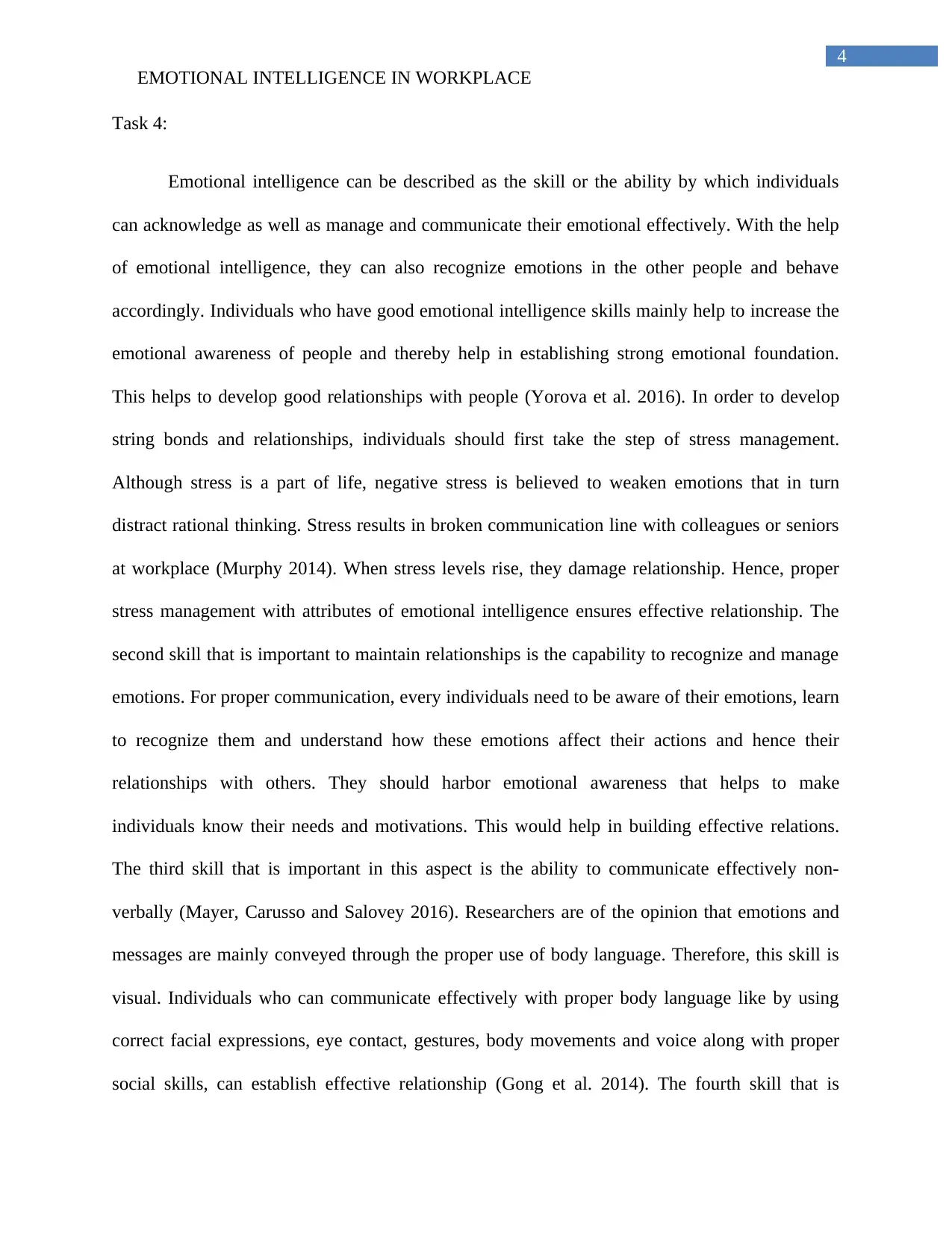
4
EMOTIONAL INTELLIGENCE IN WORKPLACE
Task 4:
Emotional intelligence can be described as the skill or the ability by which individuals
can acknowledge as well as manage and communicate their emotional effectively. With the help
of emotional intelligence, they can also recognize emotions in the other people and behave
accordingly. Individuals who have good emotional intelligence skills mainly help to increase the
emotional awareness of people and thereby help in establishing strong emotional foundation.
This helps to develop good relationships with people (Yorova et al. 2016). In order to develop
string bonds and relationships, individuals should first take the step of stress management.
Although stress is a part of life, negative stress is believed to weaken emotions that in turn
distract rational thinking. Stress results in broken communication line with colleagues or seniors
at workplace (Murphy 2014). When stress levels rise, they damage relationship. Hence, proper
stress management with attributes of emotional intelligence ensures effective relationship. The
second skill that is important to maintain relationships is the capability to recognize and manage
emotions. For proper communication, every individuals need to be aware of their emotions, learn
to recognize them and understand how these emotions affect their actions and hence their
relationships with others. They should harbor emotional awareness that helps to make
individuals know their needs and motivations. This would help in building effective relations.
The third skill that is important in this aspect is the ability to communicate effectively non-
verbally (Mayer, Carusso and Salovey 2016). Researchers are of the opinion that emotions and
messages are mainly conveyed through the proper use of body language. Therefore, this skill is
visual. Individuals who can communicate effectively with proper body language like by using
correct facial expressions, eye contact, gestures, body movements and voice along with proper
social skills, can establish effective relationship (Gong et al. 2014). The fourth skill that is
EMOTIONAL INTELLIGENCE IN WORKPLACE
Task 4:
Emotional intelligence can be described as the skill or the ability by which individuals
can acknowledge as well as manage and communicate their emotional effectively. With the help
of emotional intelligence, they can also recognize emotions in the other people and behave
accordingly. Individuals who have good emotional intelligence skills mainly help to increase the
emotional awareness of people and thereby help in establishing strong emotional foundation.
This helps to develop good relationships with people (Yorova et al. 2016). In order to develop
string bonds and relationships, individuals should first take the step of stress management.
Although stress is a part of life, negative stress is believed to weaken emotions that in turn
distract rational thinking. Stress results in broken communication line with colleagues or seniors
at workplace (Murphy 2014). When stress levels rise, they damage relationship. Hence, proper
stress management with attributes of emotional intelligence ensures effective relationship. The
second skill that is important to maintain relationships is the capability to recognize and manage
emotions. For proper communication, every individuals need to be aware of their emotions, learn
to recognize them and understand how these emotions affect their actions and hence their
relationships with others. They should harbor emotional awareness that helps to make
individuals know their needs and motivations. This would help in building effective relations.
The third skill that is important in this aspect is the ability to communicate effectively non-
verbally (Mayer, Carusso and Salovey 2016). Researchers are of the opinion that emotions and
messages are mainly conveyed through the proper use of body language. Therefore, this skill is
visual. Individuals who can communicate effectively with proper body language like by using
correct facial expressions, eye contact, gestures, body movements and voice along with proper
social skills, can establish effective relationship (Gong et al. 2014). The fourth skill that is
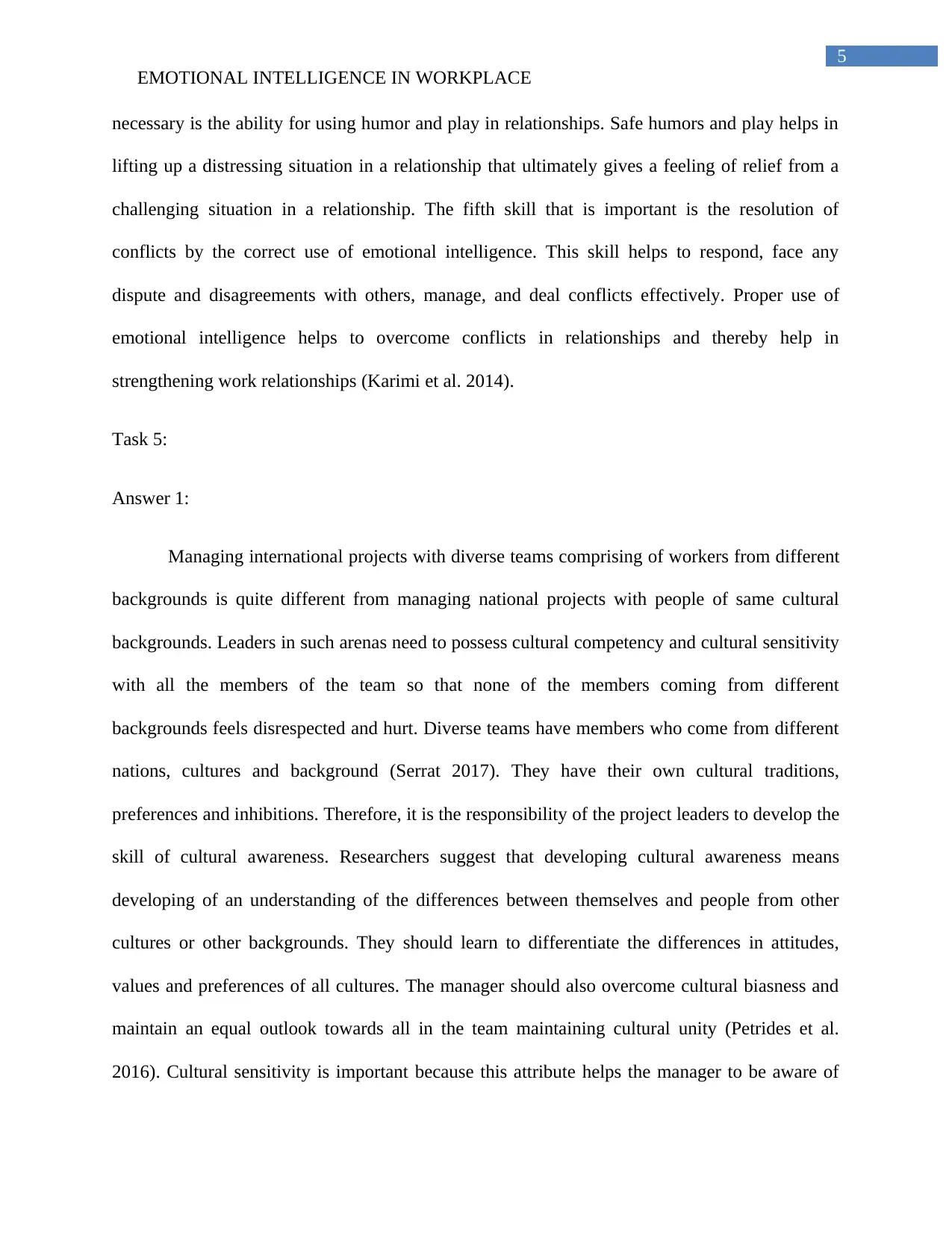
5
EMOTIONAL INTELLIGENCE IN WORKPLACE
necessary is the ability for using humor and play in relationships. Safe humors and play helps in
lifting up a distressing situation in a relationship that ultimately gives a feeling of relief from a
challenging situation in a relationship. The fifth skill that is important is the resolution of
conflicts by the correct use of emotional intelligence. This skill helps to respond, face any
dispute and disagreements with others, manage, and deal conflicts effectively. Proper use of
emotional intelligence helps to overcome conflicts in relationships and thereby help in
strengthening work relationships (Karimi et al. 2014).
Task 5:
Answer 1:
Managing international projects with diverse teams comprising of workers from different
backgrounds is quite different from managing national projects with people of same cultural
backgrounds. Leaders in such arenas need to possess cultural competency and cultural sensitivity
with all the members of the team so that none of the members coming from different
backgrounds feels disrespected and hurt. Diverse teams have members who come from different
nations, cultures and background (Serrat 2017). They have their own cultural traditions,
preferences and inhibitions. Therefore, it is the responsibility of the project leaders to develop the
skill of cultural awareness. Researchers suggest that developing cultural awareness means
developing of an understanding of the differences between themselves and people from other
cultures or other backgrounds. They should learn to differentiate the differences in attitudes,
values and preferences of all cultures. The manager should also overcome cultural biasness and
maintain an equal outlook towards all in the team maintaining cultural unity (Petrides et al.
2016). Cultural sensitivity is important because this attribute helps the manager to be aware of
EMOTIONAL INTELLIGENCE IN WORKPLACE
necessary is the ability for using humor and play in relationships. Safe humors and play helps in
lifting up a distressing situation in a relationship that ultimately gives a feeling of relief from a
challenging situation in a relationship. The fifth skill that is important is the resolution of
conflicts by the correct use of emotional intelligence. This skill helps to respond, face any
dispute and disagreements with others, manage, and deal conflicts effectively. Proper use of
emotional intelligence helps to overcome conflicts in relationships and thereby help in
strengthening work relationships (Karimi et al. 2014).
Task 5:
Answer 1:
Managing international projects with diverse teams comprising of workers from different
backgrounds is quite different from managing national projects with people of same cultural
backgrounds. Leaders in such arenas need to possess cultural competency and cultural sensitivity
with all the members of the team so that none of the members coming from different
backgrounds feels disrespected and hurt. Diverse teams have members who come from different
nations, cultures and background (Serrat 2017). They have their own cultural traditions,
preferences and inhibitions. Therefore, it is the responsibility of the project leaders to develop the
skill of cultural awareness. Researchers suggest that developing cultural awareness means
developing of an understanding of the differences between themselves and people from other
cultures or other backgrounds. They should learn to differentiate the differences in attitudes,
values and preferences of all cultures. The manager should also overcome cultural biasness and
maintain an equal outlook towards all in the team maintaining cultural unity (Petrides et al.
2016). Cultural sensitivity is important because this attribute helps the manager to be aware of
⊘ This is a preview!⊘
Do you want full access?
Subscribe today to unlock all pages.

Trusted by 1+ million students worldwide
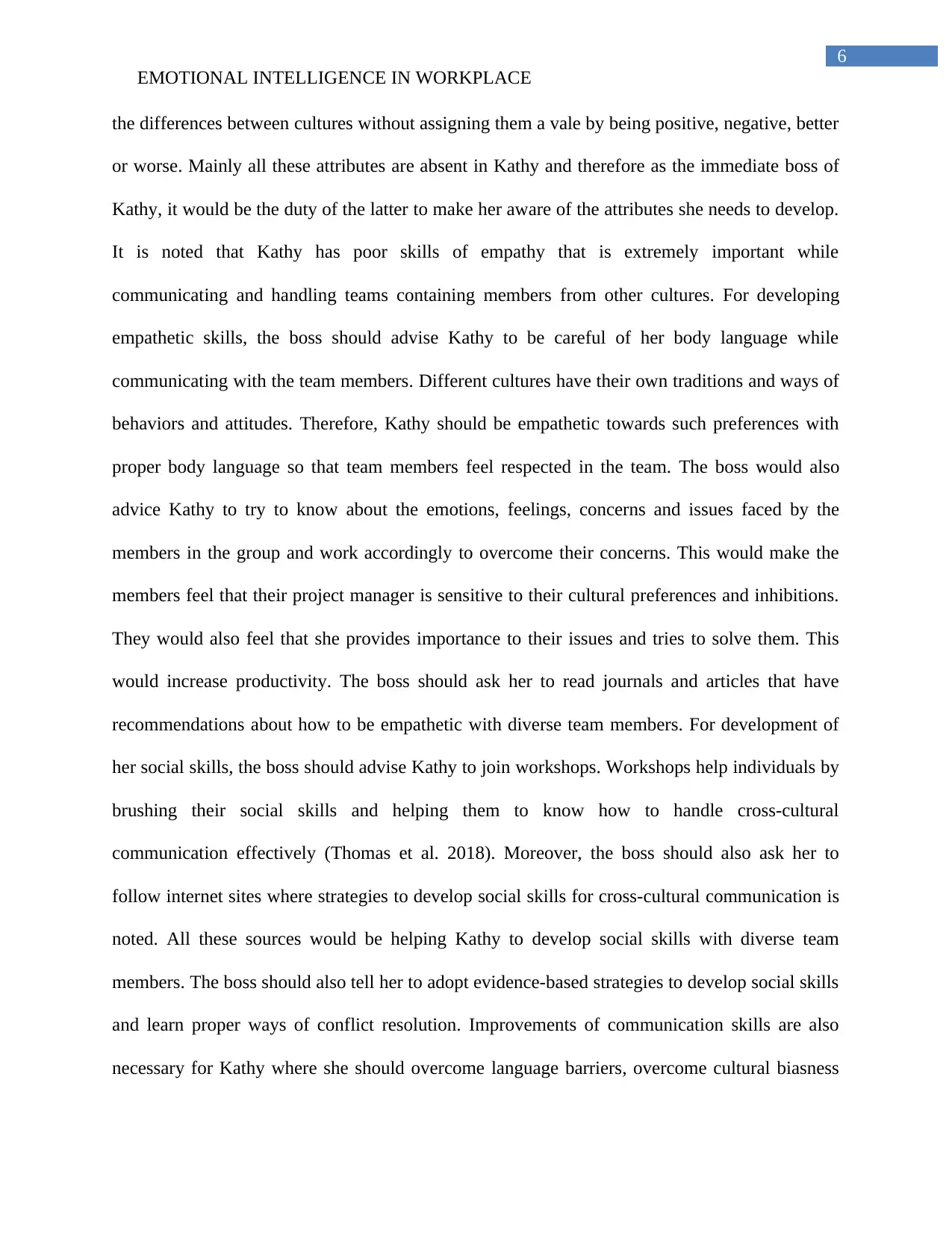
6
EMOTIONAL INTELLIGENCE IN WORKPLACE
the differences between cultures without assigning them a vale by being positive, negative, better
or worse. Mainly all these attributes are absent in Kathy and therefore as the immediate boss of
Kathy, it would be the duty of the latter to make her aware of the attributes she needs to develop.
It is noted that Kathy has poor skills of empathy that is extremely important while
communicating and handling teams containing members from other cultures. For developing
empathetic skills, the boss should advise Kathy to be careful of her body language while
communicating with the team members. Different cultures have their own traditions and ways of
behaviors and attitudes. Therefore, Kathy should be empathetic towards such preferences with
proper body language so that team members feel respected in the team. The boss would also
advice Kathy to try to know about the emotions, feelings, concerns and issues faced by the
members in the group and work accordingly to overcome their concerns. This would make the
members feel that their project manager is sensitive to their cultural preferences and inhibitions.
They would also feel that she provides importance to their issues and tries to solve them. This
would increase productivity. The boss should ask her to read journals and articles that have
recommendations about how to be empathetic with diverse team members. For development of
her social skills, the boss should advise Kathy to join workshops. Workshops help individuals by
brushing their social skills and helping them to know how to handle cross-cultural
communication effectively (Thomas et al. 2018). Moreover, the boss should also ask her to
follow internet sites where strategies to develop social skills for cross-cultural communication is
noted. All these sources would be helping Kathy to develop social skills with diverse team
members. The boss should also tell her to adopt evidence-based strategies to develop social skills
and learn proper ways of conflict resolution. Improvements of communication skills are also
necessary for Kathy where she should overcome language barriers, overcome cultural biasness
EMOTIONAL INTELLIGENCE IN WORKPLACE
the differences between cultures without assigning them a vale by being positive, negative, better
or worse. Mainly all these attributes are absent in Kathy and therefore as the immediate boss of
Kathy, it would be the duty of the latter to make her aware of the attributes she needs to develop.
It is noted that Kathy has poor skills of empathy that is extremely important while
communicating and handling teams containing members from other cultures. For developing
empathetic skills, the boss should advise Kathy to be careful of her body language while
communicating with the team members. Different cultures have their own traditions and ways of
behaviors and attitudes. Therefore, Kathy should be empathetic towards such preferences with
proper body language so that team members feel respected in the team. The boss would also
advice Kathy to try to know about the emotions, feelings, concerns and issues faced by the
members in the group and work accordingly to overcome their concerns. This would make the
members feel that their project manager is sensitive to their cultural preferences and inhibitions.
They would also feel that she provides importance to their issues and tries to solve them. This
would increase productivity. The boss should ask her to read journals and articles that have
recommendations about how to be empathetic with diverse team members. For development of
her social skills, the boss should advise Kathy to join workshops. Workshops help individuals by
brushing their social skills and helping them to know how to handle cross-cultural
communication effectively (Thomas et al. 2018). Moreover, the boss should also ask her to
follow internet sites where strategies to develop social skills for cross-cultural communication is
noted. All these sources would be helping Kathy to develop social skills with diverse team
members. The boss should also tell her to adopt evidence-based strategies to develop social skills
and learn proper ways of conflict resolution. Improvements of communication skills are also
necessary for Kathy where she should overcome language barriers, overcome cultural biasness
Paraphrase This Document
Need a fresh take? Get an instant paraphrase of this document with our AI Paraphraser
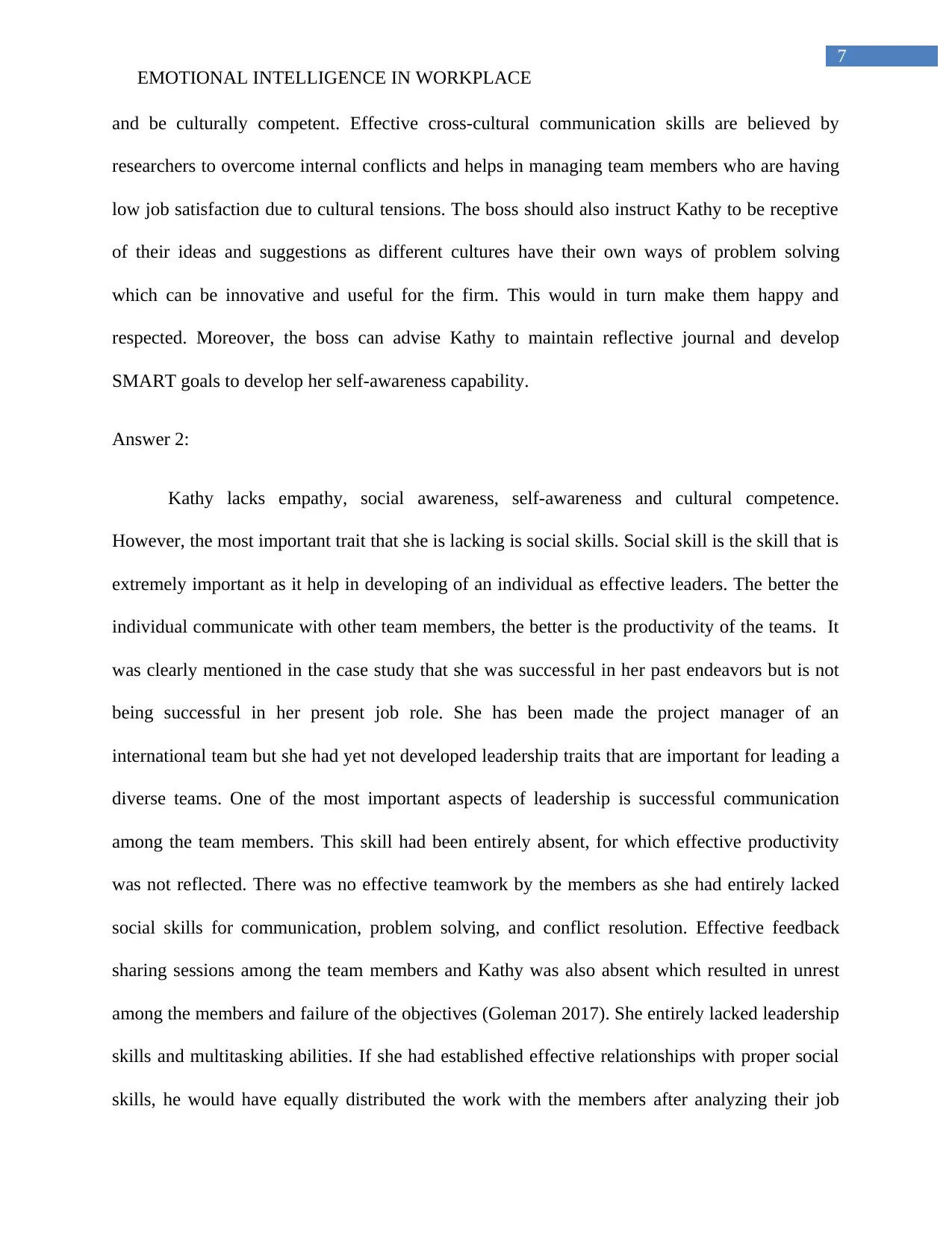
7
EMOTIONAL INTELLIGENCE IN WORKPLACE
and be culturally competent. Effective cross-cultural communication skills are believed by
researchers to overcome internal conflicts and helps in managing team members who are having
low job satisfaction due to cultural tensions. The boss should also instruct Kathy to be receptive
of their ideas and suggestions as different cultures have their own ways of problem solving
which can be innovative and useful for the firm. This would in turn make them happy and
respected. Moreover, the boss can advise Kathy to maintain reflective journal and develop
SMART goals to develop her self-awareness capability.
Answer 2:
Kathy lacks empathy, social awareness, self-awareness and cultural competence.
However, the most important trait that she is lacking is social skills. Social skill is the skill that is
extremely important as it help in developing of an individual as effective leaders. The better the
individual communicate with other team members, the better is the productivity of the teams. It
was clearly mentioned in the case study that she was successful in her past endeavors but is not
being successful in her present job role. She has been made the project manager of an
international team but she had yet not developed leadership traits that are important for leading a
diverse teams. One of the most important aspects of leadership is successful communication
among the team members. This skill had been entirely absent, for which effective productivity
was not reflected. There was no effective teamwork by the members as she had entirely lacked
social skills for communication, problem solving, and conflict resolution. Effective feedback
sharing sessions among the team members and Kathy was also absent which resulted in unrest
among the members and failure of the objectives (Goleman 2017). She entirely lacked leadership
skills and multitasking abilities. If she had established effective relationships with proper social
skills, he would have equally distributed the work with the members after analyzing their job
EMOTIONAL INTELLIGENCE IN WORKPLACE
and be culturally competent. Effective cross-cultural communication skills are believed by
researchers to overcome internal conflicts and helps in managing team members who are having
low job satisfaction due to cultural tensions. The boss should also instruct Kathy to be receptive
of their ideas and suggestions as different cultures have their own ways of problem solving
which can be innovative and useful for the firm. This would in turn make them happy and
respected. Moreover, the boss can advise Kathy to maintain reflective journal and develop
SMART goals to develop her self-awareness capability.
Answer 2:
Kathy lacks empathy, social awareness, self-awareness and cultural competence.
However, the most important trait that she is lacking is social skills. Social skill is the skill that is
extremely important as it help in developing of an individual as effective leaders. The better the
individual communicate with other team members, the better is the productivity of the teams. It
was clearly mentioned in the case study that she was successful in her past endeavors but is not
being successful in her present job role. She has been made the project manager of an
international team but she had yet not developed leadership traits that are important for leading a
diverse teams. One of the most important aspects of leadership is successful communication
among the team members. This skill had been entirely absent, for which effective productivity
was not reflected. There was no effective teamwork by the members as she had entirely lacked
social skills for communication, problem solving, and conflict resolution. Effective feedback
sharing sessions among the team members and Kathy was also absent which resulted in unrest
among the members and failure of the objectives (Goleman 2017). She entirely lacked leadership
skills and multitasking abilities. If she had established effective relationships with proper social
skills, he would have equally distributed the work with the members after analyzing their job
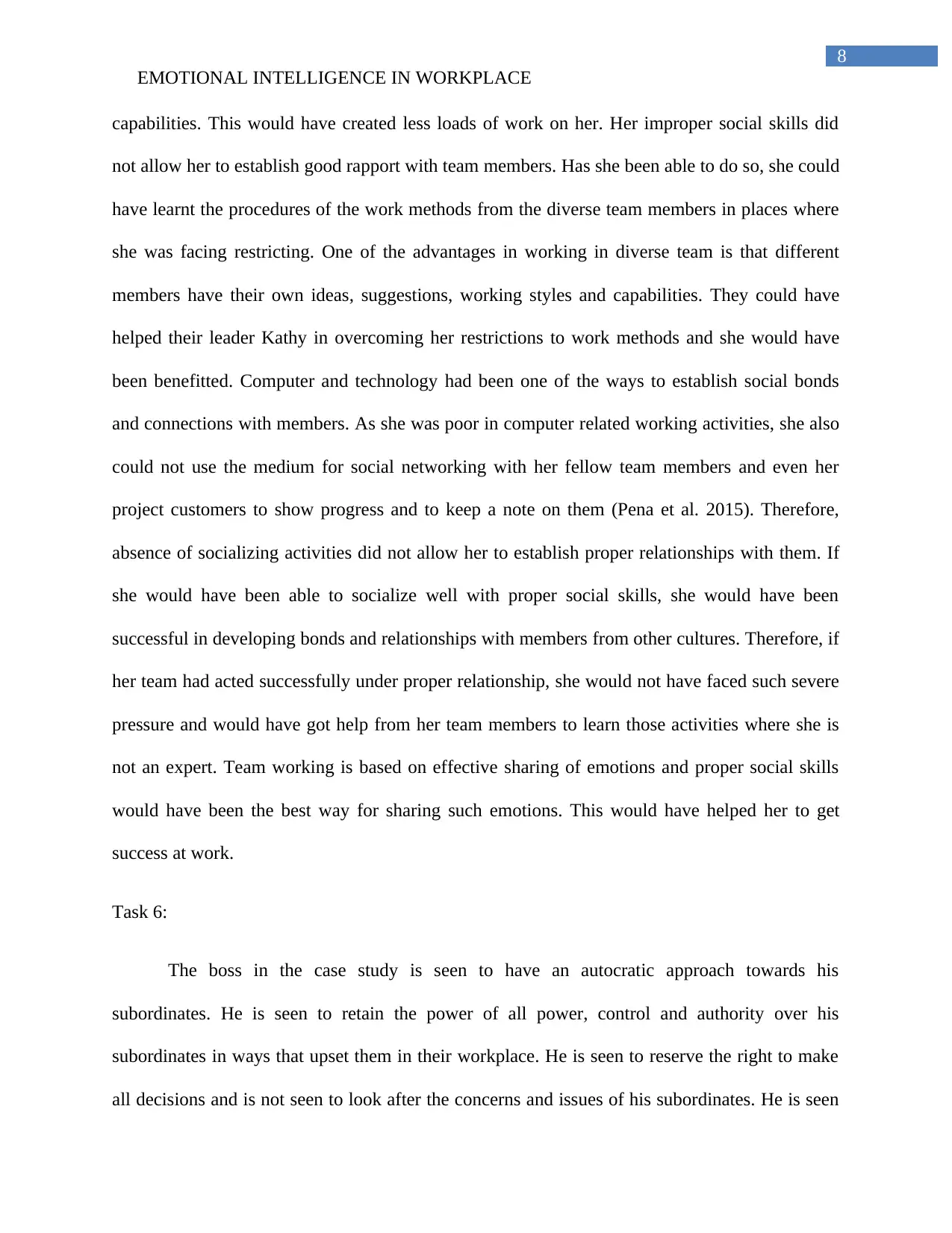
8
EMOTIONAL INTELLIGENCE IN WORKPLACE
capabilities. This would have created less loads of work on her. Her improper social skills did
not allow her to establish good rapport with team members. Has she been able to do so, she could
have learnt the procedures of the work methods from the diverse team members in places where
she was facing restricting. One of the advantages in working in diverse team is that different
members have their own ideas, suggestions, working styles and capabilities. They could have
helped their leader Kathy in overcoming her restrictions to work methods and she would have
been benefitted. Computer and technology had been one of the ways to establish social bonds
and connections with members. As she was poor in computer related working activities, she also
could not use the medium for social networking with her fellow team members and even her
project customers to show progress and to keep a note on them (Pena et al. 2015). Therefore,
absence of socializing activities did not allow her to establish proper relationships with them. If
she would have been able to socialize well with proper social skills, she would have been
successful in developing bonds and relationships with members from other cultures. Therefore, if
her team had acted successfully under proper relationship, she would not have faced such severe
pressure and would have got help from her team members to learn those activities where she is
not an expert. Team working is based on effective sharing of emotions and proper social skills
would have been the best way for sharing such emotions. This would have helped her to get
success at work.
Task 6:
The boss in the case study is seen to have an autocratic approach towards his
subordinates. He is seen to retain the power of all power, control and authority over his
subordinates in ways that upset them in their workplace. He is seen to reserve the right to make
all decisions and is not seen to look after the concerns and issues of his subordinates. He is seen
EMOTIONAL INTELLIGENCE IN WORKPLACE
capabilities. This would have created less loads of work on her. Her improper social skills did
not allow her to establish good rapport with team members. Has she been able to do so, she could
have learnt the procedures of the work methods from the diverse team members in places where
she was facing restricting. One of the advantages in working in diverse team is that different
members have their own ideas, suggestions, working styles and capabilities. They could have
helped their leader Kathy in overcoming her restrictions to work methods and she would have
been benefitted. Computer and technology had been one of the ways to establish social bonds
and connections with members. As she was poor in computer related working activities, she also
could not use the medium for social networking with her fellow team members and even her
project customers to show progress and to keep a note on them (Pena et al. 2015). Therefore,
absence of socializing activities did not allow her to establish proper relationships with them. If
she would have been able to socialize well with proper social skills, she would have been
successful in developing bonds and relationships with members from other cultures. Therefore, if
her team had acted successfully under proper relationship, she would not have faced such severe
pressure and would have got help from her team members to learn those activities where she is
not an expert. Team working is based on effective sharing of emotions and proper social skills
would have been the best way for sharing such emotions. This would have helped her to get
success at work.
Task 6:
The boss in the case study is seen to have an autocratic approach towards his
subordinates. He is seen to retain the power of all power, control and authority over his
subordinates in ways that upset them in their workplace. He is seen to reserve the right to make
all decisions and is not seen to look after the concerns and issues of his subordinates. He is seen
⊘ This is a preview!⊘
Do you want full access?
Subscribe today to unlock all pages.

Trusted by 1+ million students worldwide
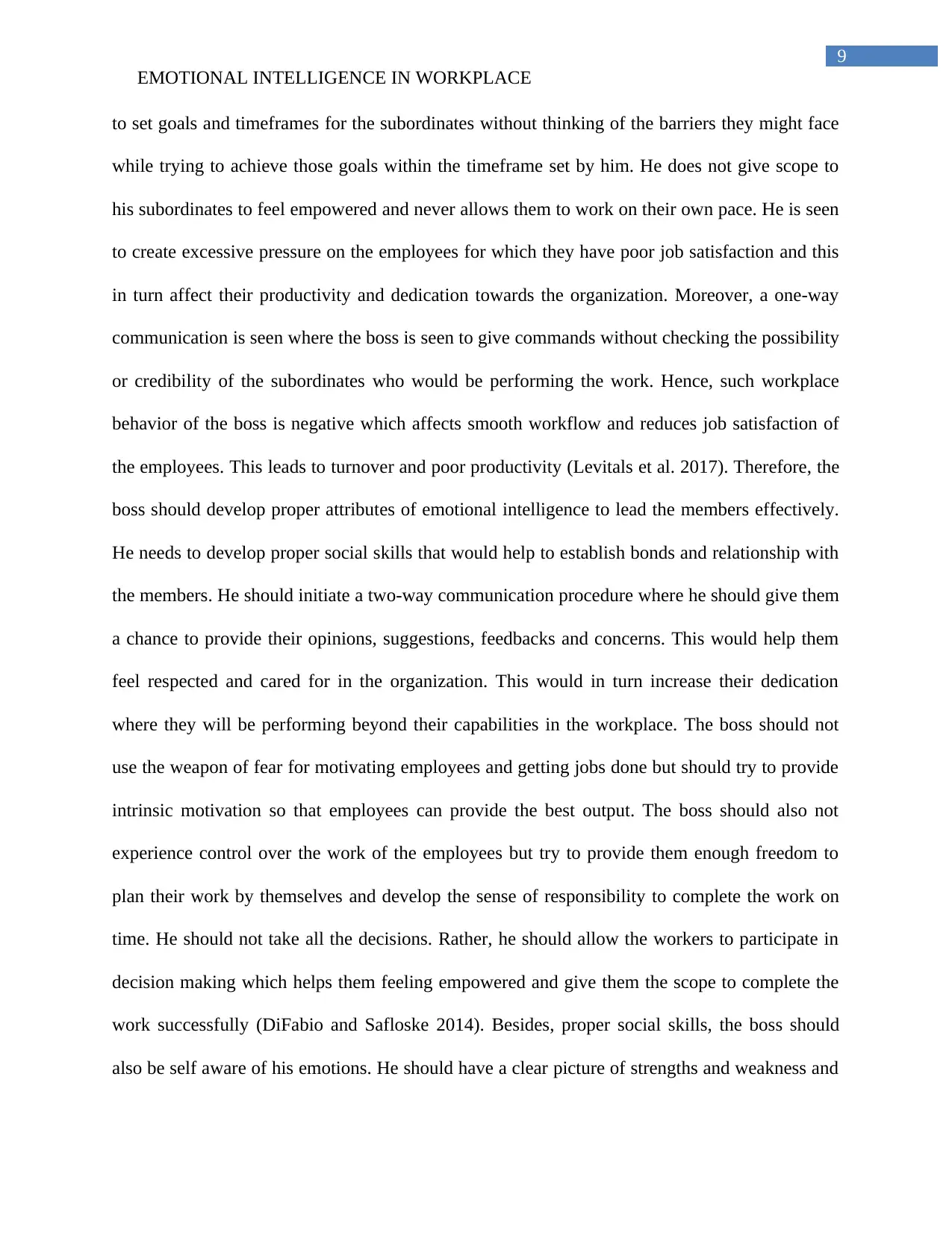
9
EMOTIONAL INTELLIGENCE IN WORKPLACE
to set goals and timeframes for the subordinates without thinking of the barriers they might face
while trying to achieve those goals within the timeframe set by him. He does not give scope to
his subordinates to feel empowered and never allows them to work on their own pace. He is seen
to create excessive pressure on the employees for which they have poor job satisfaction and this
in turn affect their productivity and dedication towards the organization. Moreover, a one-way
communication is seen where the boss is seen to give commands without checking the possibility
or credibility of the subordinates who would be performing the work. Hence, such workplace
behavior of the boss is negative which affects smooth workflow and reduces job satisfaction of
the employees. This leads to turnover and poor productivity (Levitals et al. 2017). Therefore, the
boss should develop proper attributes of emotional intelligence to lead the members effectively.
He needs to develop proper social skills that would help to establish bonds and relationship with
the members. He should initiate a two-way communication procedure where he should give them
a chance to provide their opinions, suggestions, feedbacks and concerns. This would help them
feel respected and cared for in the organization. This would in turn increase their dedication
where they will be performing beyond their capabilities in the workplace. The boss should not
use the weapon of fear for motivating employees and getting jobs done but should try to provide
intrinsic motivation so that employees can provide the best output. The boss should also not
experience control over the work of the employees but try to provide them enough freedom to
plan their work by themselves and develop the sense of responsibility to complete the work on
time. He should not take all the decisions. Rather, he should allow the workers to participate in
decision making which helps them feeling empowered and give them the scope to complete the
work successfully (DiFabio and Safloske 2014). Besides, proper social skills, the boss should
also be self aware of his emotions. He should have a clear picture of strengths and weakness and
EMOTIONAL INTELLIGENCE IN WORKPLACE
to set goals and timeframes for the subordinates without thinking of the barriers they might face
while trying to achieve those goals within the timeframe set by him. He does not give scope to
his subordinates to feel empowered and never allows them to work on their own pace. He is seen
to create excessive pressure on the employees for which they have poor job satisfaction and this
in turn affect their productivity and dedication towards the organization. Moreover, a one-way
communication is seen where the boss is seen to give commands without checking the possibility
or credibility of the subordinates who would be performing the work. Hence, such workplace
behavior of the boss is negative which affects smooth workflow and reduces job satisfaction of
the employees. This leads to turnover and poor productivity (Levitals et al. 2017). Therefore, the
boss should develop proper attributes of emotional intelligence to lead the members effectively.
He needs to develop proper social skills that would help to establish bonds and relationship with
the members. He should initiate a two-way communication procedure where he should give them
a chance to provide their opinions, suggestions, feedbacks and concerns. This would help them
feel respected and cared for in the organization. This would in turn increase their dedication
where they will be performing beyond their capabilities in the workplace. The boss should not
use the weapon of fear for motivating employees and getting jobs done but should try to provide
intrinsic motivation so that employees can provide the best output. The boss should also not
experience control over the work of the employees but try to provide them enough freedom to
plan their work by themselves and develop the sense of responsibility to complete the work on
time. He should not take all the decisions. Rather, he should allow the workers to participate in
decision making which helps them feeling empowered and give them the scope to complete the
work successfully (DiFabio and Safloske 2014). Besides, proper social skills, the boss should
also be self aware of his emotions. He should have a clear picture of strengths and weakness and
Paraphrase This Document
Need a fresh take? Get an instant paraphrase of this document with our AI Paraphraser
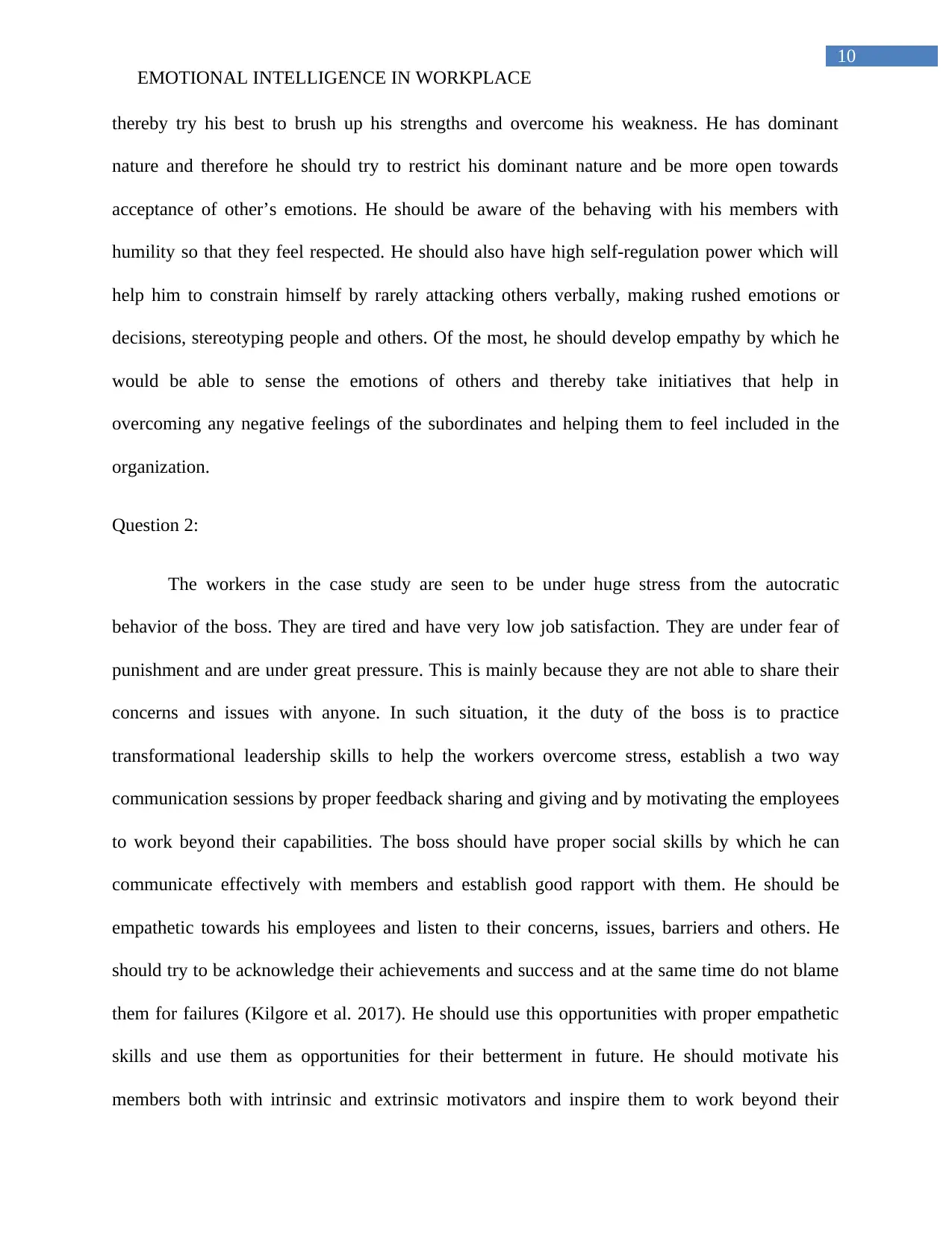
10
EMOTIONAL INTELLIGENCE IN WORKPLACE
thereby try his best to brush up his strengths and overcome his weakness. He has dominant
nature and therefore he should try to restrict his dominant nature and be more open towards
acceptance of other’s emotions. He should be aware of the behaving with his members with
humility so that they feel respected. He should also have high self-regulation power which will
help him to constrain himself by rarely attacking others verbally, making rushed emotions or
decisions, stereotyping people and others. Of the most, he should develop empathy by which he
would be able to sense the emotions of others and thereby take initiatives that help in
overcoming any negative feelings of the subordinates and helping them to feel included in the
organization.
Question 2:
The workers in the case study are seen to be under huge stress from the autocratic
behavior of the boss. They are tired and have very low job satisfaction. They are under fear of
punishment and are under great pressure. This is mainly because they are not able to share their
concerns and issues with anyone. In such situation, it the duty of the boss is to practice
transformational leadership skills to help the workers overcome stress, establish a two way
communication sessions by proper feedback sharing and giving and by motivating the employees
to work beyond their capabilities. The boss should have proper social skills by which he can
communicate effectively with members and establish good rapport with them. He should be
empathetic towards his employees and listen to their concerns, issues, barriers and others. He
should try to be acknowledge their achievements and success and at the same time do not blame
them for failures (Kilgore et al. 2017). He should use this opportunities with proper empathetic
skills and use them as opportunities for their betterment in future. He should motivate his
members both with intrinsic and extrinsic motivators and inspire them to work beyond their
EMOTIONAL INTELLIGENCE IN WORKPLACE
thereby try his best to brush up his strengths and overcome his weakness. He has dominant
nature and therefore he should try to restrict his dominant nature and be more open towards
acceptance of other’s emotions. He should be aware of the behaving with his members with
humility so that they feel respected. He should also have high self-regulation power which will
help him to constrain himself by rarely attacking others verbally, making rushed emotions or
decisions, stereotyping people and others. Of the most, he should develop empathy by which he
would be able to sense the emotions of others and thereby take initiatives that help in
overcoming any negative feelings of the subordinates and helping them to feel included in the
organization.
Question 2:
The workers in the case study are seen to be under huge stress from the autocratic
behavior of the boss. They are tired and have very low job satisfaction. They are under fear of
punishment and are under great pressure. This is mainly because they are not able to share their
concerns and issues with anyone. In such situation, it the duty of the boss is to practice
transformational leadership skills to help the workers overcome stress, establish a two way
communication sessions by proper feedback sharing and giving and by motivating the employees
to work beyond their capabilities. The boss should have proper social skills by which he can
communicate effectively with members and establish good rapport with them. He should be
empathetic towards his employees and listen to their concerns, issues, barriers and others. He
should try to be acknowledge their achievements and success and at the same time do not blame
them for failures (Kilgore et al. 2017). He should use this opportunities with proper empathetic
skills and use them as opportunities for their betterment in future. He should motivate his
members both with intrinsic and extrinsic motivators and inspire them to work beyond their
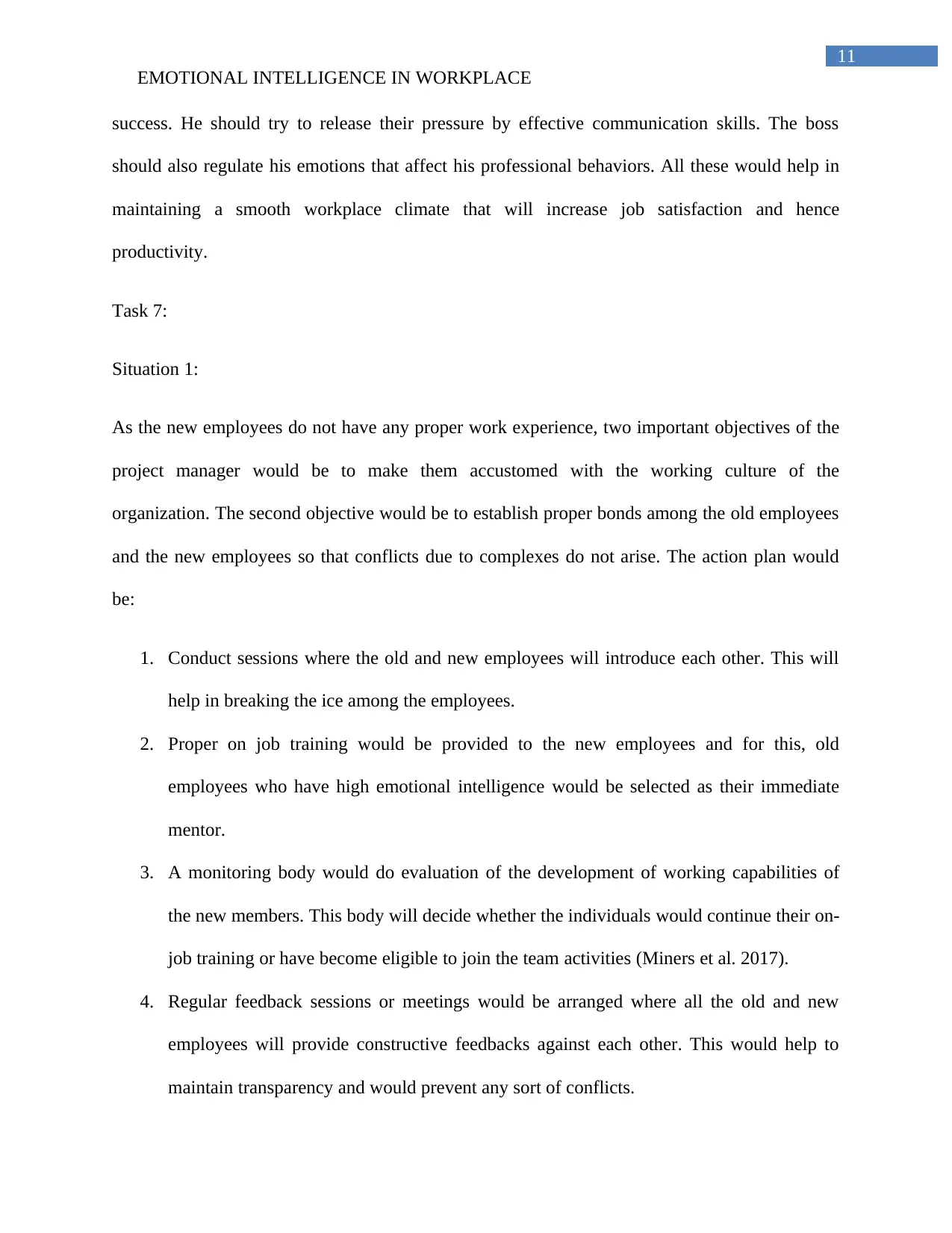
11
EMOTIONAL INTELLIGENCE IN WORKPLACE
success. He should try to release their pressure by effective communication skills. The boss
should also regulate his emotions that affect his professional behaviors. All these would help in
maintaining a smooth workplace climate that will increase job satisfaction and hence
productivity.
Task 7:
Situation 1:
As the new employees do not have any proper work experience, two important objectives of the
project manager would be to make them accustomed with the working culture of the
organization. The second objective would be to establish proper bonds among the old employees
and the new employees so that conflicts due to complexes do not arise. The action plan would
be:
1. Conduct sessions where the old and new employees will introduce each other. This will
help in breaking the ice among the employees.
2. Proper on job training would be provided to the new employees and for this, old
employees who have high emotional intelligence would be selected as their immediate
mentor.
3. A monitoring body would do evaluation of the development of working capabilities of
the new members. This body will decide whether the individuals would continue their on-
job training or have become eligible to join the team activities (Miners et al. 2017).
4. Regular feedback sessions or meetings would be arranged where all the old and new
employees will provide constructive feedbacks against each other. This would help to
maintain transparency and would prevent any sort of conflicts.
EMOTIONAL INTELLIGENCE IN WORKPLACE
success. He should try to release their pressure by effective communication skills. The boss
should also regulate his emotions that affect his professional behaviors. All these would help in
maintaining a smooth workplace climate that will increase job satisfaction and hence
productivity.
Task 7:
Situation 1:
As the new employees do not have any proper work experience, two important objectives of the
project manager would be to make them accustomed with the working culture of the
organization. The second objective would be to establish proper bonds among the old employees
and the new employees so that conflicts due to complexes do not arise. The action plan would
be:
1. Conduct sessions where the old and new employees will introduce each other. This will
help in breaking the ice among the employees.
2. Proper on job training would be provided to the new employees and for this, old
employees who have high emotional intelligence would be selected as their immediate
mentor.
3. A monitoring body would do evaluation of the development of working capabilities of
the new members. This body will decide whether the individuals would continue their on-
job training or have become eligible to join the team activities (Miners et al. 2017).
4. Regular feedback sessions or meetings would be arranged where all the old and new
employees will provide constructive feedbacks against each other. This would help to
maintain transparency and would prevent any sort of conflicts.
⊘ This is a preview!⊘
Do you want full access?
Subscribe today to unlock all pages.

Trusted by 1+ million students worldwide
1 out of 19
Related Documents
Your All-in-One AI-Powered Toolkit for Academic Success.
+13062052269
info@desklib.com
Available 24*7 on WhatsApp / Email
![[object Object]](/_next/static/media/star-bottom.7253800d.svg)
Unlock your academic potential
Copyright © 2020–2025 A2Z Services. All Rights Reserved. Developed and managed by ZUCOL.




